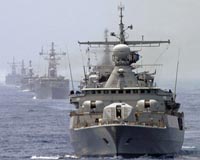 |
Riyadh, Saudi Arabia (UPI) Mar 4, 2009 Singapore's navy warned that terrorists plan to attack oil tankers in the choke point Strait of Malacca through which 15 millions barrels of Asia-bound Gulf oil, about one-third of seaborne supplies, pass every day. That advisory issued Wednesday set off alarms in the global energy industry, which has long braced for sustained attacks by al-Qaida and other jihadist organizations. The alert from Singapore was not the only warning of dangers to the industry to have surfaced in recent days. On Wednesday, the European Union Naval Force command center in Nairobi, Kenya, said that Somali pirates hijacked a 5,136-ton Saudi Arabian tanker in the Gulf of Aden Monday. The pirates seized several tankers in recent months despite the deployment of the EU naval flotilla and a U.S.-led task force to protect the busy shipping lanes in the Gulf that lies between the Red Sea and the Indian Ocean. The pirates are motivated primarily by the hefty ransoms they can get in exchange for the ships and their crews. But Western security authorities remain fearful that terrorist groups such as al-Qaida's various franchises may emulate the seaborne marauders and seize tankers to turn them into massive floating bombs. The 600-mile Malacca Strait, which has also been plagued by pirates in recent years, runs between Malaysia and the Indonesia island of Sumatra. The waterway, only about 2 miles wide at its narrowest point, is the shortest route between the Gulf and the Pacific, Every year some 90,000 vessels sail through it. That's six times the volume of traffic through the Suez Canal that links the Mediterranean to the Red Sea. That's another potentially dangerous choke point. In 2009, Egyptian security authorities rounded up a large group of suspected militants supposedly linked to the Lebanese Hezbollah movement, which is backed by Iran. The suspects are on trial in Cairo on charges of planning to sabotage ships in the 119-mile canal, a strategic waterway linking Europe and Asia, and blow up oil pipelines. A suspected al-Qaida cell in Egypt's Sinai Peninsula was allegedly planning to bomb natural gas pipelines between Israel and Egypt in 2009, officials in Cairo said. The Strait of Hormuz, the only gateway in and out of the Persian Gulf and through which one-fifth of the world's oil supplies pass, is threatened with closure by Iran if it is attacked over its contentious nuclear program. That would send oil prices soaring and cause serious global economic damage. Another vulnerable point for the tanker trade is the Bab al-Mandeb Strait, a key oil artery at the southern end of the Red Sea. The narrow waterway, north of the pirate-infested Gulf of Aden, links the Red Sea with the Indian Ocean. On Feb. 8, Said al-Shihri, deputy commander of al-Qaida in Yemen, which controls the Read Sea's eastern shore, urged jihadists in Yemen and nearby Somalia to link up and take control of the Bab al-Mandeb, which is about 20 miles wide. Yemen, where al-Qaida is active, is extremely unstable, as is Somalia, across the Gulf of Aden. There are myriad difficulties in the way of the jihadists in the two countries linking up but the Sanaa government is taking the threat seriously. Syrian Foreign Minister Abu Bakr al-Kurbi insisted Feb. 23 that the extremists could never completely control the strait but could "threaten ships by attacking them with missiles or capturing them in international waters like the pirates of Somalia." The energy industry is also vulnerable to land attack. Oil installations in Saudi Arabia, Yemen and Iraq have all been targets since 2001. The attacks in Saudi Arabia and Yemen have been unsuccessful but Iraq's oil industry was seriously damaged by insurgent attacks, which could resume once foreign oil companies move in to develop Iraq's vast oil fields. Kuwait's state security announced in August that it had thwarted a plot to blow up the emirate's Shuaiba refinery by rounding up six jihadists who had also planned attacks on a U.S. base and the security service's headquarters. In strife-torn Pakistan, authorities said they foiled an attack on the Kemari oil refinery in Karachi, the country's commercial center, in September. The installation is highly strategic. It not only handles most of Pakistan's oil but supplies U.S. and NATO forces fighting in neighboring Afghanistan.
Share This Article With Planet Earth
Related Links Powering The World in the 21st Century at Energy-Daily.com
 Argentina angling for U.S. Falklands role
Argentina angling for U.S. Falklands roleBuenos Aires (UPI) Mar 2, 2009 Argentina is angling for a U.S. role in its Falklands oil dispute with Britain that will go beyond Washington sitting on the fence as the elder cousin to both Buenos Aires and London, analysts said Tuesday. U.S. Secretary of State Hillary Clinton swept into the Argentine capital as part of her Latin American tour, only to face searching questions about where U.S. loyalties lay in Argent ... read more |
|
| The content herein, unless otherwise known to be public domain, are Copyright 1995-2010 - SpaceDaily. AFP and UPI Wire Stories are copyright Agence France-Presse and United Press International. ESA Portal Reports are copyright European Space Agency. All NASA sourced material is public domain. Additional copyrights may apply in whole or part to other bona fide parties. Advertising does not imply endorsement,agreement or approval of any opinions, statements or information provided by SpaceDaily on any Web page published or hosted by SpaceDaily. Privacy Statement |